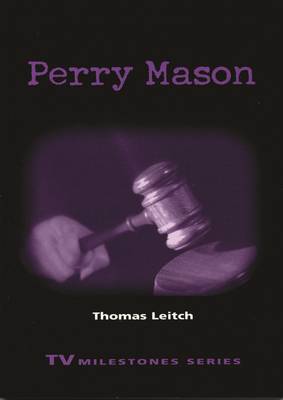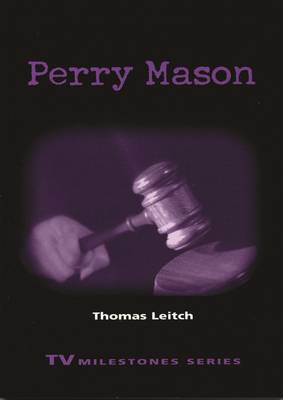
- Afhalen na 1 uur in een winkel met voorraad
- Gratis thuislevering in België vanaf € 30
- Ruim aanbod met 7 miljoen producten
- Afhalen na 1 uur in een winkel met voorraad
- Gratis thuislevering in België vanaf € 30
- Ruim aanbod met 7 miljoen producten
Omschrijving
An exploration of the enduring popularity of the television series Perry Mason and its universal reputation as the most formulaic program in the history of broadcast television.
Perry Mason was one of the most successful television programs from the 1950s and remains one of the most influential crime melodramas from any period. The show's influence goes far beyond its nine-year tenure (1957-66), the millions of dollars it generated for its creators and for CBS, and the definitive identification it provided its star, Raymond Burr. Perry Mason has become a true piece of Americana, evolving through a formulaic approach that law professors continue to use today as a teaching tool.
In his examination of Perry Mason, author Thomas Leitch looks at why this series has appealed to so many for so long and what the continued appeal tells us about Americans' attitudes toward lawyers and the law, then and now. Beginning with its roots in earlier detective fiction, stories of fictional attorneys, and the work of Erle Stanley Gardner (the show's creator), Leitch lays out the circumstances under which Perry Mason was conceived and marketed as a distinct franchise. The evolution of Perry Mason is charted here in an inclusive manner, discussing the show's broadcast history (ending with the series of two-hour telemovies that aired nearly twenty years after the original series ended) alongside its generic nature and place within popular culture, the show's ideological dynamic, and issues of authorship in the context of television. This concise study is an excellent tool for television and media scholars as well as fans of the Perry Mason series.
Specificaties
Betrokkenen
- Auteur(s):
- Uitgeverij:
Inhoud
- Aantal bladzijden:
- 144
- Taal:
- Engels
- Reeks:
Eigenschappen
- Productcode (EAN):
- 9780814331217
- Verschijningsdatum:
- 19/09/2005
- Uitvoering:
- Paperback
- Formaat:
- Trade paperback (VS)
- Afmetingen:
- 129 mm x 182 mm
- Gewicht:
- 154 g

Alleen bij Standaard Boekhandel
Beoordelingen
We publiceren alleen reviews die voldoen aan de voorwaarden voor reviews. Bekijk onze voorwaarden voor reviews.











